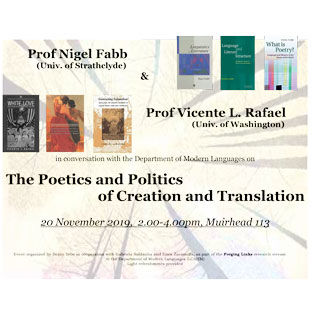The poetics and politics of creation and translation
- Dates
- Wednesday 20 November 2019 (14:00-16:00)

Professor Nigel Fabb (University of Strathclyde) and Professor Vicente L. Rafael (University of Washington, Seattle) in conversation with the Department of Modern Languages, University of Birmingham.
For this first major event of the academic year in the ‘Forging Links’ stream, we will benefit from the complementary insights of Prof. Nigel Fabb from the University of Strathclyde and Prof. Vicente L. Rafael from the University of Washington. They will draw upon their respective areas of expertise, covering poetics, linguistics, literature and history to explore the dynamics of literary and poetic creation, from psychological and literary linguistic, postcolonial, transnational and trans-linguistic perspectives.
In order to encourage interactivity, our speakers will be invited to address questions which we will put to them in advance. We are therefore inviting you all to submit the questions you may want to see addressed. If you are not familiar with their work, see their profiles here: Nigel Fabb and Vicente Rafael.
In case you’re lacking in inspiration these are questions we thought ourselves, and you’re all also welcome to vote or suggest reformulations of those. Looking forward to your contributions. This promises to be a very stimulating transdisciplinary dialogue.
Suggestions can be submitted to b.c.sebe@bham.ac.uk.
Examples of questions currently envisaged include the following:
- What is the relevance/use of the concept of literary universals in the age of world literature? And when it comes to literary translation?
- To what extent is literary or poetic creation contingent upon the language in which it is produced?
- Is there a link between poetics and national ‘imagined communities’?
- Is it true that ‘the medium is the message’ when it comes to poetic creation? / What is the role of the medium in literary creation?
- ‘Language is a process of free creation: its laws and principles are fixed, but the manner in which the principles of generation are used is free and infinitely varied’. How do you relate with this statement from Noam Chomsky about this ‘process of free creation’?
- When we talk about the insurgency of language, or linguistic insurgency, don’t we risk downplaying the role of humans as users of language, shouldn’t we talk about the insurgency of speakers, writers, translators?
Event organized by Berny Sèbe in cooperation with Gabriela Saldanha and Enea Zaramella, as part of the Forging Links research stream.